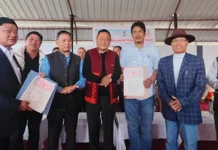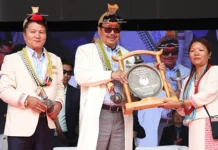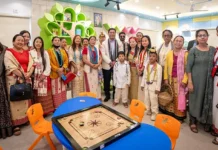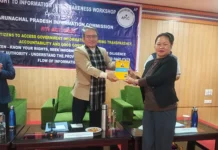ZIRO, 23 Jun: Biodiversity Management Committee (BMC) members, gaon buras, staff of the Arunachal Pradesh Biodiversity Board (APBB), officers from all line departments, technical experts, and other stakeholders participated in a capacity building programme organised here in Lower Subansiri district by the APBB recently.
The event was aimed to enhance the knowledge and skills of local stakeholders in managing and conserving the region’s rich biodiversity.
Addressing the participants, APBB Member Secretary HB Abo highlighted the significance of grassroots participation, community engagement, and aligning conservation efforts with the sustainable development goals to achieve the objectives outlined in the State Biodiversity Strategy and Action Plan 2025-2035.
APBB Research Officer Dr Bamin Yakang conducted an insightful session on the Biological Diversity Act, 2002, and the BD (Amendment) Act, 2023. She highlighted the importance of updating the people’s biodiversity register, besides access and benefit sharing and responsibilities of the BMCs, panchayats, and local stakeholders for effective biodiversity management.
Horticulture Development Officer Millo Tara addressed the local farmers and community members, emphasizing sustainable cultivation practices, conservation of native flora, organic farming, water conservation techniques like drip irrigation, and the preservation of medicinal and timber species.
Agriculture Development Officer Koj Hormin highlighted the rising issue of wild black grasshopper infestations linked to climate change, and stressed the importance of ecological balance, pest management, and government schemes such as Atma Krishi Yojana to combat these challenges.
Fishery Department Division Officer Lyagi Lasa presented a comprehensive approach to strengthen local fish production, reduce dependence on external sources, and promote sustainable fishing practices. He underscored the importance of preserving ecosystems like paddy fields to prevent soil erosion, water pollution, and habitat destruction to boost the local economy and food security.
SFIR scientist in-charge KS Rab spoke on the recent data records on Arunachal Pradesh’ extraordinary biodiversity, detailing over 200 mammal species, 115 reptiles, 65 amphibians, 850-900 butterfly species, over 6,000 arthropods, and 260 fish species. He emphasized the need to protect these ecosystems from threats, and to capitalise the natural resources for livelihood generation.
APBB consultant Ashwini Krishna dwelt on the State Biodiversity Strategy and Action Plan and the ongoing projects proposal under the ten-year plan, emphasizing on integrated conservation efforts by incorporating indigenous knowledge and traditional livelihoods into conservation strategies.
The programme also facilitated discussions between local bodies and departmental officers to strengthen coordination and reinforce collective responsibility towards biodiversity conservation and sustainable development.




